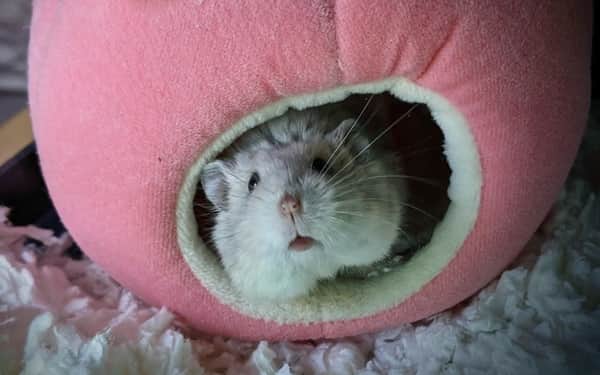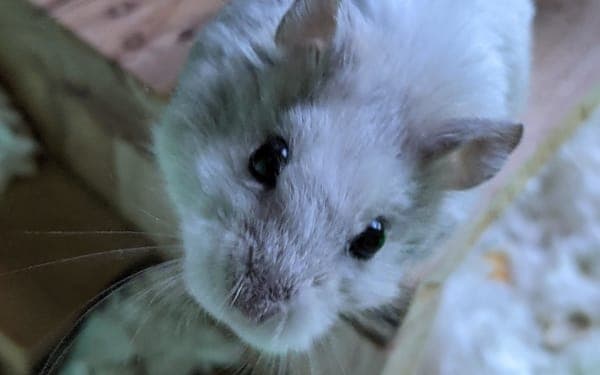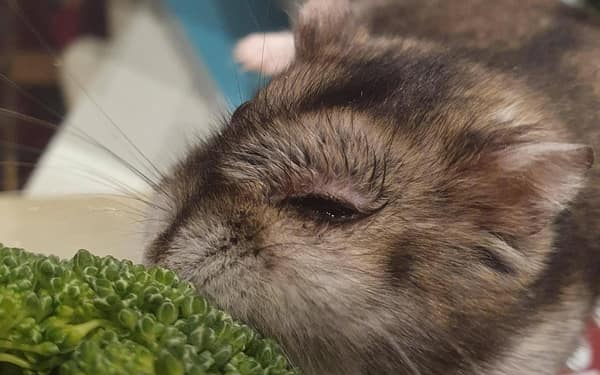Sometimes, right when a hamster owner thinks they have their tiny pal figured out, there are still surprises waiting for us that are confusing at best, and concerning at worst, such as constant squeaking. Sometimes these things just happen, but there is likely no cause for concern.
Why won’t my hamster stop squeaking? The most likely reason, if your hamster is happy and healthy, is because it is extremely excited or happy. However, depending on the frequency of the squeaking and other factors, more could be going on that may require your intervention.
This article will examine happy hamster vocalization, irritation or annoyance with the surrounding environment or others in the home, how illness or injury may be driving your pet to talk to you, and the possibility of sexual maturity compelling your pal to speak.
They Are Excited and Just Can’t Hide It
While hamsters are not necessarily the most vocal of our domestic friends, they can and do communicate with us in numerous ways when they see fit. The most common sounds you may hear from your hamster are squeaking and hissing, although chirping and teeth clicking are common as well.
Without context, your furry friend’s squeaks may initially be difficult to interpret; however, with a little bit of knowledge regarding outside factors and signs to look for you will be able to translate your pal’s exclamations in no time.
If you have a happy, healthy hamster who is largely content within its environment and you hear lots of squeaks, chances are it is simply very happy or excited about something. Hamsters do not vocalize much, but when they do it means they are feeling quite strongly about something.
If your hamster often squeaks around mealtimes or when it is being given a favorite treat, it is extremely excited about the delicious fare you offered. Perhaps your pal squeaks when you present it with an interesting new toy, or when it plays with a favorite toy.
Observe your hamster when the squeaks occur and look for other signs of happiness or contentment like yawning and stretching, to determine if your ham is simply basking in the good life.
Furthermore, if you have more than one hamster living in the same enclosure, particularly if they are social dwarf breeds like winter white Russian or Roborovski hamsters, you might hear excited squeaking when your pets interact with each other.
Sometimes these tiny critters will squeak with excitement when they see one another or whilst playing together. Again, observe your pets while they are squeaking and look for chasing, sniffing, and grooming as signs those squeaks are all in good fun.
Most of the time, squeaking out of happiness or excitement likely will be in short bouts, so listening for the periodicity of the sounds and observing your hamster while it squeaks will help determine if this is the case. Unfortunately, due to the ambiguity of hamster-speak, without more context it might still be a challenge to figure out.
For example, there may be no outward-presenting factors that would indicate your ham is anything but content, but if you are hearing persistent and/or sharp squeaks, they might be trying to tell you something else entirely.
Proclaiming Their Vexation
Just as they squeak when they are happy, hamsters will also squeak if they are irritated or annoyed about something. Hamsters do not handle stress well as a rule, so they experience irritation, annoyance, and/or anxiety on a regular basis. This means you must be very observant of your furry friend and its surroundings to glean the context you need to translate hamster-speak.
If you suspect your hamster is vocalizing out of annoyance or irritation, listen for persistent squeaking, as opposed to occasional, sporadic happy squeaks, in addition to hissing or teeth clicking. Also look for pacing, cage climbing or bar biting, and excessive grooming, which are all common signs of stress in hamsters.
There is a litany of reasons your pocket-sized pal might be worked up; we must remember that hamsters are prey animals and are naturally skittish when it comes to other animals (particularly predatory ones like cats or dogs), loud children, noises, and so forth.
Examine the environment around your hamster’s enclosure to see if you can eliminate any stressors that could be causing your pal to cry out.
First, make sure your hamster’s enclosure is large enough (24 inches by 12 inches, with 12 inches of height, at the very least) as too-small living conditions are a common stressor for our tiny pals.
Further, ensuring your hamster has plenty of enrichment will prevent boredom-related stress and irritation. Adding toys, chew blocks, and the classic running wheel are great ways to help enrich your pet’s enclosure.
Now take a step back and observe the area surrounding your furry friend’s home—are there other animals that share the space? If so, the persistence of their presence and their scent could be causing your hamster a great deal of distress. It is okay to let your pets interact or be around one another (always under supervision) but try to keep their living quarters as separated as possible.
Make sure the room your hamster is in is kept dry and relatively cool (65- to 75-degrees Fahrenheit) with gentle, consistent lighting. Your furry friend is nocturnal, so turning lights on and off too often or having lights that are overly bright is not great for their wellbeing.
Finally, make sure your hamster’s enclosure is not near any source of ultrasound, such as television sets, computer monitors, or household appliances like dishwashers, as their tiny ears are extremely sensitive to it.
Sometimes, even if your pal lives in hamster paradise, it will still get annoyed, and it will make sure you know it. Because hamsters all have different personalities and preferences, this annoyance could stem from just about anything.
Perhaps your friend is feeling neglected and wants your undivided attention and playtime, or maybe you recently moved something in its enclosure that it felt did not need to be moved. If your furry friend lives with a cage-mate, especially a new cage-mate, they might be getting on one another’s nerves.
Even in closely-bonded pairs, this sometimes happens—allow them to resolve their issues between themselves unless it looks like they might hurt each other. Additionally, if you have only recently brought your pal home from a store or breeder, it might just be a little stressed from the move and will calm down once it realizes it is safe.
If you have determined that the squeaks are not those of happiness or excitement, and your hamster’s environment is conducive to wellbeing and contentment, it is time to rule out the possibility of sickness or injury.
Green Around the Gills
If your pal’s squeaks are sharp and persistent and have only recently begun, they may indicate an injury or illness which should be addressed right away. Since they hail from harsh, dry, food-scarce desert and steppe environments, hamsters are hardy little creatures considering their size.
However, when they get injured or become sick, things can become serious quite quickly. If you suspect illness or injury, be on the lookout for signs and symptoms like these:
- Decreased appetite
- Lethargy
- Huddled or hunched posture
- Ruffled, unkempt coat and/or hair loss
- Sneezing/wheezing and/or discharge around nose and eyes
- Wetness around the tail and/or diarrhea
- Localized redness or swelling around an area
- Open scratches or wounds
- Dragging a limb
If you see one or more of these signs and symptoms coupled with persistent, sharp squeaks, get your furry friend to a veterinarian for treatment. Luckily, most of the more common ailments from which a hamster may suffer are easy to treat if they are caught early enough, meaning you and your pal can go back to playtime before you know it.
If you have read this far and still cannot make sense of your hamster’s ranting, there may be a very simple explanation behind it all: mating calls.
The Language of Love
If you have a female hamster or hamsters, it is important to note that they have estrus cycles, or “heats” about every four days or so. Sometimes, when in heat, female hamsters will squeak as a mating call, even if there are no males around.
If you have noticed a pattern of squeaking from your lady ham, meaning somewhat persistent squeaks about once a week, she might be putting herself out there for a potential date. Conversely, male hamsters will also squeak for a mating call, but typically only if they know a female is around to hear them.
If you have a male hamster housed anywhere near a female (even in separate rooms, they have very keen senses of smell) he might be serenading her! In either case this is not an issue unless you have a female and a male housed together, in which case you may already have several bundles of joy on the way.
Pregnancy occurs very quickly in hamsters and gestation may only be from 16 to 30 days, depending on the breed. If you are not breeding, make sure to separate them right away and get your girl to the veterinarian to make sure all is well with her and your potential new additions.
Conclusion
If your furry friend is happy and healthy, chances are lots of squeaking just means they are extremely excited about something and want you to know about it. Hamster-speak is highly contextual, however, so make sure you are particularly observant of your pal’s surroundings and interactions to make sure they are not simply irritated or stressed.
Further, rule out the possibility of illness or injury as soon as possible to prevent a sickness or wound from progressing too far. Finally, your hamster’s squeaks could be the language of love if you have female hamsters, or males housed near females.
In any case, if you are vigilant and proactive, you will be able to translate your pal’s exclamations and enjoy each other’s company for years to come.




